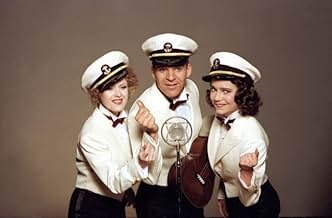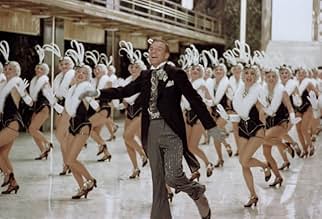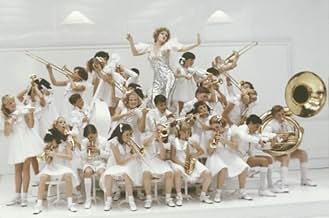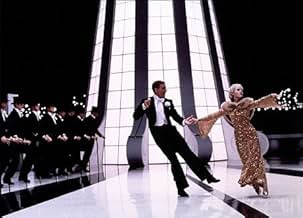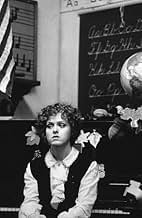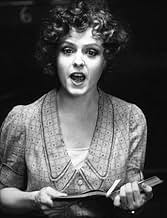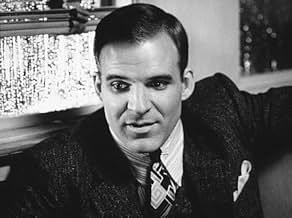CALIFICACIÓN DE IMDb
6.5/10
6.6 k
TU CALIFICACIÓN
Durante la Gran Depresión, un vendedor de partituras busca escapar de su vida aburrida a través de la música popular y una historia de amor con una maestra de escuela.Durante la Gran Depresión, un vendedor de partituras busca escapar de su vida aburrida a través de la música popular y una historia de amor con una maestra de escuela.Durante la Gran Depresión, un vendedor de partituras busca escapar de su vida aburrida a través de la música popular y una historia de amor con una maestra de escuela.
- Nominado a 3 premios Óscar
- 3 premios ganados y 9 nominaciones en total
Francis X. McCarthy
- The Bartender
- (as Frank McCarthy)
Shirley Kirkes Mar
- Tart
- (as Shirley Kirkes)
Opiniones destacadas
It's 1934 Chicago. Sheet music salesman Arthur Parker (Steve Martin) can't get any love from his wife Joan (Jessica Harper) both in the bedroom and in the bank book. She wants to keep her inheritance for a rainy day but he wants to use it for his business. He befriends penniless hitchhiking Accordion Man. He falls for school teacher Eileen (Bernadette Peters) and they have a short affair as he lies to her about being a widow telling her to "take the pain away". His wife Joan entices him back with sex and money. Eileen is fired for being pregnant out of wedlock. Arthur meets a blind girl calling her beautiful. Later the Accordion Man rapes her and kills her. A desperate Eileen falls into the arms of Tom the pimp (Christopher Walken).
This is a sad depressing movie juxtaposed by the bright shiny surreal song and dance show. The story is such a downer. Arthur is a horrible person. Eileen is an innocent that is destroyed. There is a horrible crime. Yet this is a fantasy with dance reminiscent of the 30s except darker. It's a very odd mix and is almost experimental in its nature. It's definitely not a comedy.
This is a sad depressing movie juxtaposed by the bright shiny surreal song and dance show. The story is such a downer. Arthur is a horrible person. Eileen is an innocent that is destroyed. There is a horrible crime. Yet this is a fantasy with dance reminiscent of the 30s except darker. It's a very odd mix and is almost experimental in its nature. It's definitely not a comedy.
When Herb Ross opened "Pennies From Heaven" during Christmas of 1981 it met with harsh press and public indifference. Many concluded the musical was dead.
But "Pennies," like Bob Fosse's "All That Jazz" released two years before, is a key transitional work that juxtaposed the cynicism of the '70s to the exhilaration and escapist fantasy of its buoyant Depression era score.
Steve Martin ran the risk of alienating his fan base by trading in the "Wild and Crazy" guy for the brooding, unfaithful Arthur Parker. But he's a revelation. And what a dancer!
It was no surprise when audiences stayed away.
By all means watch it today, particularly on the new widescreen DVD release. You'll walk away with a greater appreciation of Christopher Walken, Bernadette Peters and especially Steve Martin.
It makes it so much harder to watch this major talent wasting himself in such tripe as "Cheaper by the Dozen" and "Bringing Down the House."
But "Pennies," like Bob Fosse's "All That Jazz" released two years before, is a key transitional work that juxtaposed the cynicism of the '70s to the exhilaration and escapist fantasy of its buoyant Depression era score.
Steve Martin ran the risk of alienating his fan base by trading in the "Wild and Crazy" guy for the brooding, unfaithful Arthur Parker. But he's a revelation. And what a dancer!
It was no surprise when audiences stayed away.
By all means watch it today, particularly on the new widescreen DVD release. You'll walk away with a greater appreciation of Christopher Walken, Bernadette Peters and especially Steve Martin.
It makes it so much harder to watch this major talent wasting himself in such tripe as "Cheaper by the Dozen" and "Bringing Down the House."
I am glad I don't live in Frostbite Falls because I might shiver at the thought of such a complex and clever film as PENNIES FROM HEAVEN. Made with a massive 1980 budget of $22 million and all of it up there on the screen, this genuine masterwork is one of the great unappreciated and misunderstood films of its day. The biggest hurdle the film could not overcome (then) was the casting of comedy stars in Art Deco darkness. Steve Martin had just scored a bullseye in the wild comedy THE JERK. For mainstream audiences to even then turn around and slightly embrace the sad loneliness of PENNIES' aching melancholy is impossible. PENNIES' failed and was consigned to misfire history. Today in 2005 this film deserves to stand with CHICAGO or even MOULIN ROUGE in its sly dark new century crowd pleaser theatrics. It is a film for this century and if audiences today have the chance to appreciate and applaud it's brilliant creative slant and dramatic spectacle, it will be a success. Possibly in the same ironic fantasy manner of THE PIRATE or YOLANDA AND THE THIEF, or LADY IN THE DARK of the 40s, ITS ALWAYS FAIR WEATHER from 1955, maybe THE BOYFRIEND of the 70s and even the original 1988 HAIRSPRAY by John Waters, PENNIES' belongs to that rare style of musical spectacle: the emotional fantasy with a dark satire core. Truly great.
This film has so many good things in it and so much talent worked so very hard on it that it's just baffling to me that so much of it doesn't work. I love '30s and '40s musicals, and I saw this film in 1981, and I've seen it about 10 times more on DVD. I like a lot of it, but somehow it's just not a very good movie, and I still can't figure out why.
The music is good. The musical numbers are creatively shot and well-executed; the Walken number alone took weeks to film. The sets, costumes, photography, and color are beautiful and give the film a real Depression feel. Clearly, no expense was spared. The actors give it their all. The re-creations of photos and paintings (including "Nighthawks" which is actually from WW2) are breathtaking. They must have been very hard to set up, light, and shoot. But, in keeping with the film's low-key style, they're not lingered on at all, and if you look away you can miss them.
Is the problem Steve Martin? This choice caused some controversy in 1981. He lacked film experience and he might not have been the ideal choice, although it's hard to guess what other leading man could have done that vaudeville stuff in 1981. Martin, at least, doesn't obviously fall down on the job; the verdict is still out. But Peters, who even apart from this film seems to belong to the '30s, holds up her end of things.
Maybe it's the script and the way the film is conceived. If the idea is to realize what these '30s drudges fantasize about-- and to do it in a '30s-musical style, as if they imagine themselves the heroes of musicals-- then there has to be something to the drudges that makes us care what they fantasize about. But there isn't enough to these people. They're drawn as thin types; yet the material is played very slowly, as if they were supposed to turn into real people at some point. They never do, and so by the end it all peters out (no pun intended). I also thought the subplot with the young girl was a maudlin absurdity, right out of a Mary Pickford tear-jerker.
Perhaps the real problem can be traced back to the origins of the project. It plays almost like an English musical made in an American style, and it doesn't work very well. The humor in the book is too tedious, too black, and too obsessed with tit jokes to be American. And the musical numbers are too slick, loud, and overproduced to be English. The filmmakers couldn't find a way to make these two parts fit together. And so they are just jammed together over and over again. One is constantly aware of the bad fit. It just doesn't come together, but in the various parts there are still more than enough reasons to see it.
The music is good. The musical numbers are creatively shot and well-executed; the Walken number alone took weeks to film. The sets, costumes, photography, and color are beautiful and give the film a real Depression feel. Clearly, no expense was spared. The actors give it their all. The re-creations of photos and paintings (including "Nighthawks" which is actually from WW2) are breathtaking. They must have been very hard to set up, light, and shoot. But, in keeping with the film's low-key style, they're not lingered on at all, and if you look away you can miss them.
Is the problem Steve Martin? This choice caused some controversy in 1981. He lacked film experience and he might not have been the ideal choice, although it's hard to guess what other leading man could have done that vaudeville stuff in 1981. Martin, at least, doesn't obviously fall down on the job; the verdict is still out. But Peters, who even apart from this film seems to belong to the '30s, holds up her end of things.
Maybe it's the script and the way the film is conceived. If the idea is to realize what these '30s drudges fantasize about-- and to do it in a '30s-musical style, as if they imagine themselves the heroes of musicals-- then there has to be something to the drudges that makes us care what they fantasize about. But there isn't enough to these people. They're drawn as thin types; yet the material is played very slowly, as if they were supposed to turn into real people at some point. They never do, and so by the end it all peters out (no pun intended). I also thought the subplot with the young girl was a maudlin absurdity, right out of a Mary Pickford tear-jerker.
Perhaps the real problem can be traced back to the origins of the project. It plays almost like an English musical made in an American style, and it doesn't work very well. The humor in the book is too tedious, too black, and too obsessed with tit jokes to be American. And the musical numbers are too slick, loud, and overproduced to be English. The filmmakers couldn't find a way to make these two parts fit together. And so they are just jammed together over and over again. One is constantly aware of the bad fit. It just doesn't come together, but in the various parts there are still more than enough reasons to see it.
If you are truly interested in seeing this film, please read the review written by Pauline Kael, who with her unique voice, says everything I am about to try to say, perfectly. This may not be a movie for everybody. First, you may have to have some patience for musicals. And secondly, you may have to have patience for complex people and their problems. I have watched this movie with two friends, and the first yawned everytime the actors opened their mouths to lip sync the beautiful and strange Depression era songs. The second found the role played by Steve Martin heartbreaking, and could not watch the entire film. But I think this movie can be extremely rewarding, and have found myself watching it a least once a year for the past few years. I think the Depression makes an excellent back round in this bittersweet story of blind optimism, and this movie greatly inspires my imagination. I imagine the whole U.S. as it was in the early part of the century, filled with millions of dreamers, greedy for sex and love and money, just like people are now, only now most people have a shot at a least one of those things, and during the depression, beautiful and hopelessly empty dreams were everywhere, as poverty crushed lives right and left. Steve Martin and Bernadette Peters are as connected and magical together as they are in the Jerk. In fact, everything I love about The Jerk is what I love about Pennies From Heaven. Some of the musical sequences are breathtaking, particularly a dance number performed by Christopher Walken ! And the subtle beauty of the last song sung by Steve Martin, I don't know how to describe it. In closing, this movie is not for everybody. But I know I am not the only person out there who will see this movie as the unique gift that it is. Please give it a shot.
¿Sabías que…?
- TriviaChristopher Walken's bar-top dance scene took two months of rehearsal and two days of shooting. He claims he got compliments later from fans Fred Astaire and Gene Kelly.
- ErroresIn the classroom, a modern Canadian flag can be seen. It wasn't designed until 1964.
- Citas
Joan Parker: [referring to Arthur's male organ, after discovering he's having an affair] Cut his thing off.
[the detective shows a look of shock and disgust]
Joan Parker: I want them to cut his thing off and bury it!
- Bandas sonorasPennies from Heaven
(1936)
Written by Johnny Burke and Arthur Johnston
Published by Intersong Music
Performed by Arthur Tracy
Courtesy of Decca Co. Ltd
Later sung by Steve Martin (uncredited)
Selecciones populares
Inicia sesión para calificar y agrega a la lista de videos para obtener recomendaciones personalizadas
- How long is Pennies from Heaven?Con tecnología de Alexa
Detalles
- Fecha de lanzamiento
- País de origen
- Idioma
- También se conoce como
- Tanz in den Wolken
- Locaciones de filmación
- 4th Street Bridge, Los Ángeles, California, Estados Unidos(murder scene, S Santa Fe Ave. Overpass)
- Productoras
- Ver más créditos de la compañía en IMDbPro
Taquilla
- Presupuesto
- USD 22,000,000 (estimado)
- Total en EE. UU. y Canadá
- USD 9,171,289
- Total a nivel mundial
- USD 9,171,289
- Tiempo de ejecución1 hora 48 minutos
- Mezcla de sonido
- Relación de aspecto
- 1.85 : 1
Contribuir a esta página
Sugiere una edición o agrega el contenido que falta

Principales brechas de datos
By what name was Pennies from Heaven (1981) officially released in India in English?
Responda


